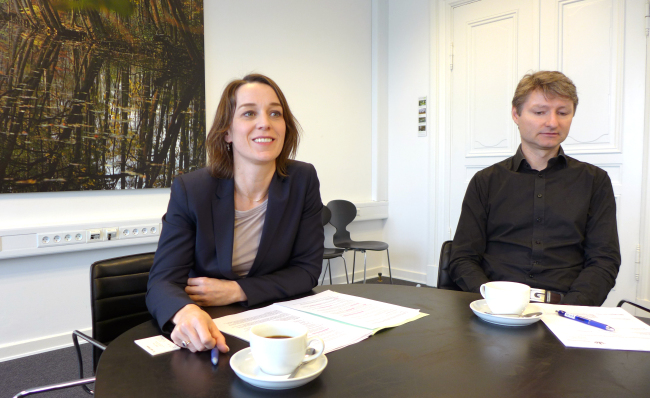Climate change provides opportunities for Denmark
By Korea HeraldPublished : March 29, 2015 - 18:31
COPENHAGEN ― Denmark is turning climate change into an opportunity and leading the way in preparing for a water-scarce future, Danish Environment Minister Kirsten Brosbol told reporters last week.
Situated between the North Sea and the Baltic Sea, Denmark has overcome its water challenges using innovative engineering.
“Not just Denmark, but the whole world is facing increasingly severe problems related to drinking water,” Brosbol told journalists from Korea, Japan, China, Singapore and India at the ministry building. “From the Danish perspective, it is both a challenge and opportunity because we can use our expertise and experience to solve these problems.”
Brosbol will attend the seventh World Water Forum in Daegu and North Gyeongsang Province from April 12-17 to promote Danish water technologies and send a political message to the United Nations about the importance of water, she said.
Situated between the North Sea and the Baltic Sea, Denmark has overcome its water challenges using innovative engineering.
“Not just Denmark, but the whole world is facing increasingly severe problems related to drinking water,” Brosbol told journalists from Korea, Japan, China, Singapore and India at the ministry building. “From the Danish perspective, it is both a challenge and opportunity because we can use our expertise and experience to solve these problems.”
Brosbol will attend the seventh World Water Forum in Daegu and North Gyeongsang Province from April 12-17 to promote Danish water technologies and send a political message to the United Nations about the importance of water, she said.

“The World Economic Forum in Davos, Switzerland this year identified water as the greatest challenge facing humanity,” the minister stressed. “Denmark’s joint water sectors will urge the U.N. to adhere to the post-2015 Sustainable Development Goals currently under negotiation.”
Korea, for its part, said it would produce a declaration urging a much-belated international coalition. The Danish Water Forum, which promotes cooperation and knowledge sharing in the water sector, will participate in Korea.
Denmark has pursued sustainable development since the 1973-74 oil crisis, and worked to increase environmental awareness among citizens.
In the 1970s, the Danish Ministry of Environment instituted a regulatory regime that held companies accountable for environmental effects, while nurturing green technologies, Brosbol pointed out.
The country’s current success in the water industry is driven by public-private partnerships, as well as high standards of regulation and innovation.
“Danish companies see regulations as an asset, rather than a liability,” emphasized Brosbol, explaining that government intervention helped the industry make technological breakthroughs and reduce its ecological footprint.
She added that government oversight had led to companies gaining an edge against international competitors as the global paradigm shifted toward sustainable development.
By investing in measures to adapt to climate change, such as coastal protection, flood management, climate resilient buildings and food security, Denmark has used the climate threat to create jobs and raise exports as part of its green growth strategy.
Denmark has one of the strictest regulations in the European Union on groundwater protection and wastewater treatment, stressed Brosbol.
“Thanks to generational efforts, the Copenhagen Harbor became clean enough to swim in, and people drink water straight from the tap,” she said. “Both large and small and medium-sized companies feed into a cycle of innovation and global business expansion.”
The Danish government also provides humanitarian and technical assistance to countries through development cooperation. Expert advisers are sent to Danish embassies around the world to give feedback to companies entering new markets, she added.
As a result, the Danish economy has grown by 80 percent since 1980, while energy consumption stayed the same and water consumption dropped by 40 percent. A new national agreement in 2012 aims for a fully functioning green economy by 2050.
The key to the Danish success is its integrated approach combining water management, climate change and urbanization, said Tanya Jacobsen, project manager at State of Green, which arranged the press tour.
“The water supply in Denmark is decentralized to the local level and water prices are set by the government,” she said. “Despite being relatively expensive compared to other countries, the price reflects costs of taxation, groundwater protection, abstraction, distribution and wastewater treatment.”
Preparing for the changing climate, urban drainage capacity has been strengthened by combining canals, lakes and retention basins, and recreational areas and green corridors were added to help cool the city and increase biodiversity.
By Joel Lee, Korea Herald correspondent (joel@heraldcorp.com)
-
Articles by Korea Herald



![[Exclusive] Korean military set to ban iPhones over 'security' concerns](http://res.heraldm.com/phpwas/restmb_idxmake.php?idx=644&simg=/content/image/2024/04/23/20240423050599_0.jpg&u=20240423183955)




![[Herald Interview] 'Amid aging population, Korea to invite more young professionals from overseas'](http://res.heraldm.com/phpwas/restmb_idxmake.php?idx=644&simg=/content/image/2024/04/24/20240424050844_0.jpg&u=20240424200058)

![[Pressure points] Leggings in public: Fashion statement or social faux pas?](http://res.heraldm.com/phpwas/restmb_idxmake.php?idx=644&simg=/content/image/2024/04/23/20240423050669_0.jpg&u=)









